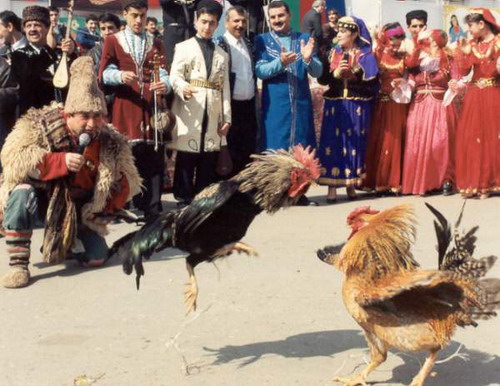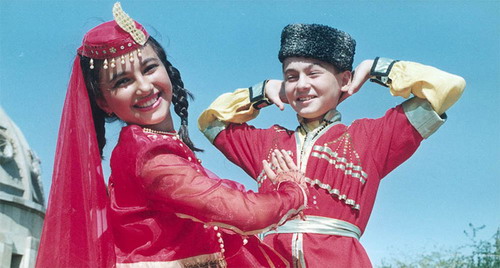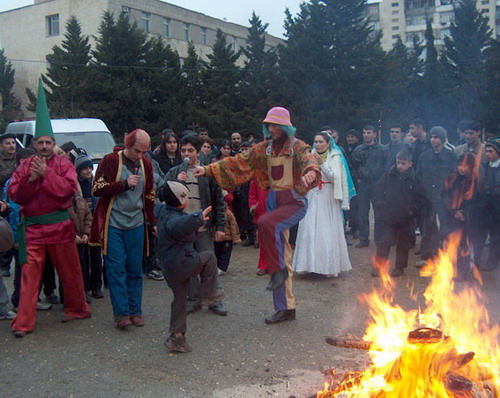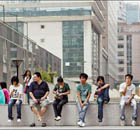Asia-Pacific
A little fire can inspire people at New Year's
By Mike Peters (China Daily/chinadaily.com.cn)
Updated: 2010-03-22 09:30
 |
Large Medium Small |
Symbols of Spring

Among holiday ceremonies the most important one is the cooking of "Samani" (millet porridge) which is a symbol of nature and human fertility and has a cult value. The ceremony of the cooking of Samani is accompanied by ceremonial songs and dances.
Novruz is always associated with the beautifully lush green color of new growth and is specifically symbolized by the growing of freshly sprouted wheat or "Samani" as Azerbaijanis refer to it. This food had magical and cultic importance and was considered sacred ritual food. For instance, Samani was used to cure infertile women: a dish with sprung wheat for Samani was put on the head of a woman; another woman poured a little water into the dish cutting the squirt with scissors and pattered: "Oh, the Power which fecundated this (samani), fecundate this woman." The fire under a Samani kettle was put by "bashi butov gadin" (the happiest woman of the community) but the entire ceremony was leading by "agbirchek" (the most respected woman). In some regions Samani was prepared adding a pinch of salt to preserve it from the evil-eye. The entire ceremony of concoction was called "Samani toyu" (Samani feast) and was accompanied with ritual dancing and singing. As to Samani rite's origin, it is considered to associate both with symbolizing the renewal of nature and the cult of plants. Now Samani is grown in a small vase and placed in a prominent place in the house, such as a table center.
Attitude of cleansing, renewal, and rebirth
As implied by its timing and natural significance, Novruz is a time of renewal and symbolizes rebirth, awakening, cleanliness and newness. Trees are pruned, fields are cleared. A tradition is the annual Novruz cleaning. Families wash their rugs and draperies, clean and wax their furniture and often repaint their homes' interior. With Novruz is when every person buys at least one set of new clothes, families visit elders and friends in their new clothes. It's a time for renewing relationships as well. People who have had quarrels and refused to speak with each other use this chance to forgive one another and renew their relationships.
Celebration of family and friends

Novruz is a family holiday. In the evening before the holiday the whole family gathers around the holiday table laid with various dishes to make the New Year rich. Traditionally, all family members had to stay at home this day, paying no visits and accepting no guests. They said: "The one that is out on the holiday eve will spend seven years in wandering". On the last night of the old year all family members spray each other with water before going to bed "to wash off" all hardships of the old year. The holiday goes on for several days and ends with festive public dancing and other entertainment of folk bands, contests of national sports. There's always lots of food and sweets at Novruz. Friends and families visit one another. Usually, a very carefully guarded hierarchy is observed and the oldest members of the community receive guests first. On the eve of Novruz, Azerbaijanis visit the cemetery where their parents are buried. Gifts and food are shared with the needy, poor, and sick.
Favorite Holiday of Children
Children love Novruz. For them, it's presents, sometimes even gold coins or brand new bills and best of all, vacation from school! On the last Wednesday prior to Novruz, children slip around to their neighbors' homes and apartments, knock at their doors, and leave their caps or little basket on the thresholds all the while hiding nearby waiting for candies, pastries and nuts. They never took it back empty cause hosts always put something in.
Fire-Jumping Tradition Backfires

Azerbaijan as a cradle of fire-worshipping had rich Novruz traditions associated with fire which also was believed a way to purify oneself. As a tribute to fire-worshiping every Tuesday during four weeks before the holiday kids jump over small bonfires and candles are lit. One of the traditions associated with Novruz is that of jumping over bonfires on the last Wednesday, "Akhir Charshanbe", before the holiday. Making fires on streets, roofs and elevated points was wide accepted and jumping over a fire on Last Wednesday was considered compulsory for community members regardless to their age and sex. After the fire dies out girls and young men collect the remaining ash and pour it somewhere in the outskirts of the village or a road. It means that the hardships of those who have jumped over the fire are destroyed and thrown out far beyond their homes.
Fortune telling
On "Akhyr Charshanba" before dark there comes the time of fortune telling. Azerbaijani girls and young men sneak to doors of their neighbors and "overheard" their conversation; then on the basis of the first words they have heard they try to tell their fortune and guess if their wishes will come true.
New Year celebrations are finished on the 13th day of Novruz. On this day in the city outskirts are held mass parties with traditional games and contests like horse or camel races in which both men and women take part. The ancient spring holiday - Novruz Bayramy - is one of the oldest and most beautiful Azerbaijani traditions. Nowadays, most of the above traditions are preserved in Azerbaijan.
Printed by the Cultural Centre "Shusha" carried out activity under Embassy of the Azerbaijan Republic in the People's Republic of China






